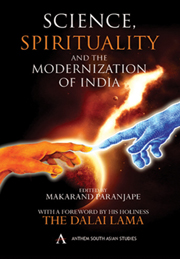Book contents
- Frontmatter
- Contents
- Notes on Contributors
- Foreword
- Editor's Preface
- I Science and Spirituality: East and West
- II Coming to Terms with Science: Some Change Agents
- III Building Bridges: Evolution, Consciousness and Healing
- CHAPTER 8 The Concept of the Yuga: Modern Scientific Approaches to Bridge Spiritual and Philosophical Concepts
- CHAPTER 9 Sri Aurobindo's Concept of Evolution of Consciousness: Exploration through the Paradigm of Health and Disease
- CHAPTER 10 The Blending of Science and Spirituality in the Ayurvedic Tradition of Healing
- CHAPTER 11 Micro-sensing by Indian Mystics
- CHAPTER 12 The Big Picture for the Science of Consciousness
- IV Science and Spirituality: Culture, Society and Gender
CHAPTER 8 - The Concept of the Yuga: Modern Scientific Approaches to Bridge Spiritual and Philosophical Concepts
from III - Building Bridges: Evolution, Consciousness and Healing
Published online by Cambridge University Press: 05 March 2012
- Frontmatter
- Contents
- Notes on Contributors
- Foreword
- Editor's Preface
- I Science and Spirituality: East and West
- II Coming to Terms with Science: Some Change Agents
- III Building Bridges: Evolution, Consciousness and Healing
- CHAPTER 8 The Concept of the Yuga: Modern Scientific Approaches to Bridge Spiritual and Philosophical Concepts
- CHAPTER 9 Sri Aurobindo's Concept of Evolution of Consciousness: Exploration through the Paradigm of Health and Disease
- CHAPTER 10 The Blending of Science and Spirituality in the Ayurvedic Tradition of Healing
- CHAPTER 11 Micro-sensing by Indian Mystics
- CHAPTER 12 The Big Picture for the Science of Consciousness
- IV Science and Spirituality: Culture, Society and Gender
Summary
Many spiritual and philosophical concepts are generally considered off limits for any scientific analysis and evaluation, as the modern scientists consider that science has developed its ideas from the observation of matter, be it in gas, liquid or solid form. This is far from the truth. There are several examples where philosophical concepts dominated the development of scientific ideas. Some of the contradictory attitudes may actually stem more from historical conflicts between religion and the empirical development of scientific principles than a real divergence between the philosophical concepts and scientific ideas. In fact, a sympathetic approach to understand the interconnection between science and spirituality/philosophy reveals more commonality and synergism than conflict and mutual exclusivity. This article will elaborate on this issue, taking examples of some of the most fundamental concepts such as the origin of the universe and time on one hand and understanding the yuga cycle on the other.
MATRIX OF MAYA
In 1993, a mainstream scientist and Nobel Laureate, Francis Crick, wrote a book called The Scientific Search for the Soul. It indicated that scientists are interested in the question of the deeper basis of the operation of this universe even as they are disillusioned with their search for the most fundamental particles constituting the elements. There is an indication that a mental game theory is taking shape from the ancient wisdom of saints and sages in terms of the exploration of Maya.
- Type
- Chapter
- Information
- Science, Spirituality and the Modernisation of India , pp. 149 - 161Publisher: Anthem PressPrint publication year: 2009



